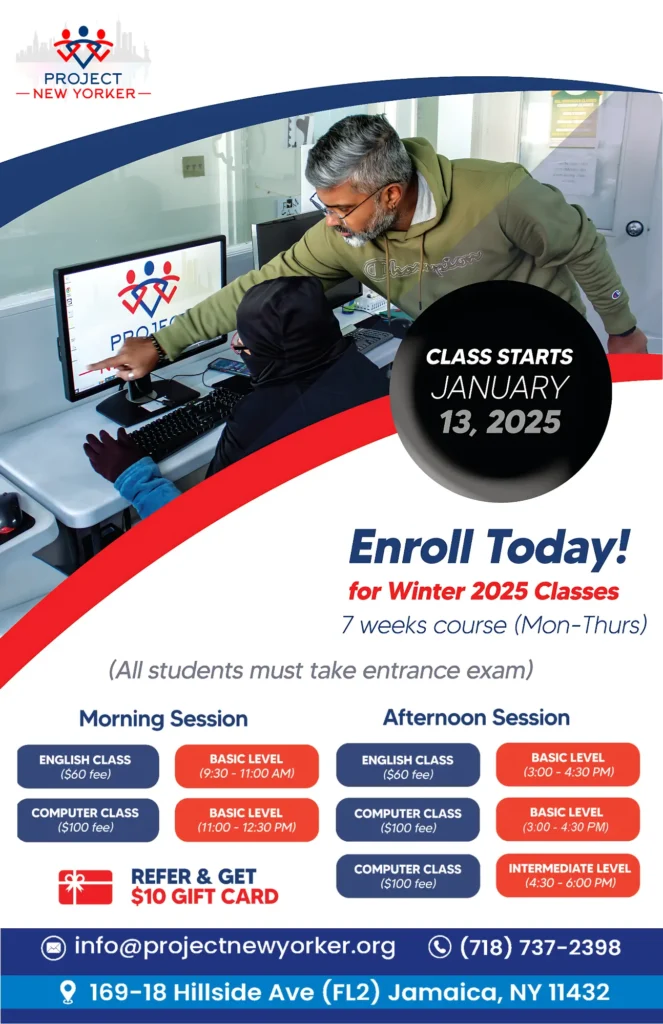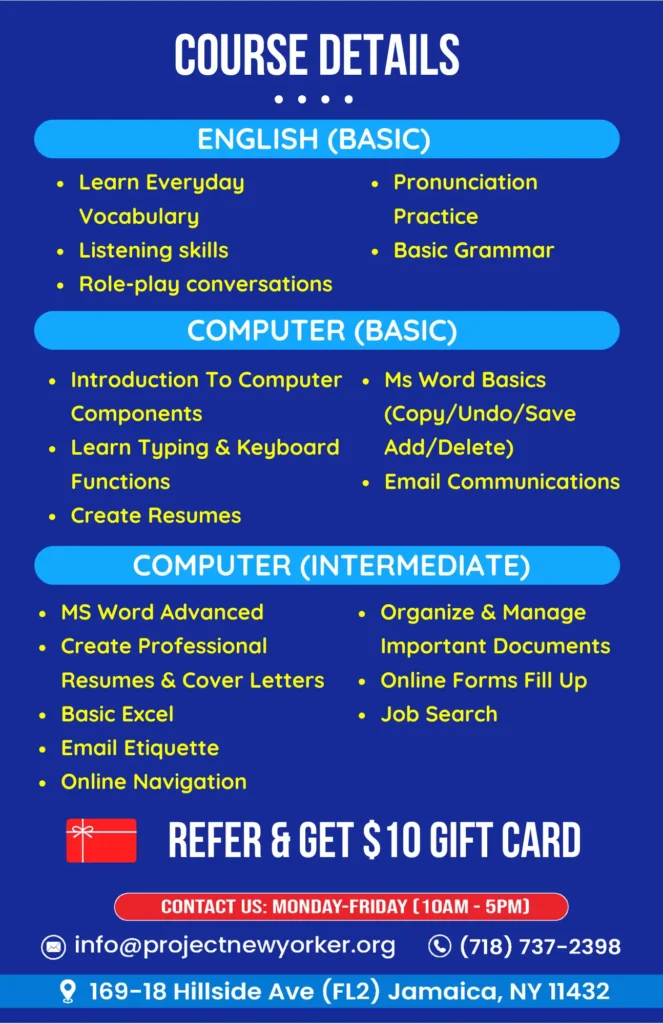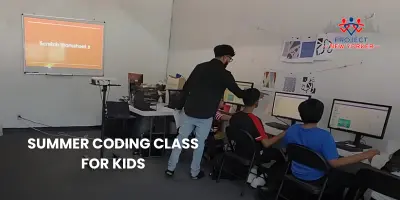How to take English class in New York
Taking an English class in New York is easier than you think. In new york city lots of School, Non Profit like Project New York, libraries offers English classes for learners of all levels.
New York is a melting pot of cultures and languages. This diversity makes it an ideal place to learn English. Whether you’re a beginner or looking to improve your skills, you’ll find the perfect class. The city’s language schools, community centers, and universities offer a variety of programs.
From intensive courses to flexible evening classes, there’s something for everyone. In this guide, we’ll explore the best ways to find and choose the right English class in New York. Get ready to embark on an exciting learning journey in one of the world’s most vibrant cities!

Choosing The Right School
If You are planning to take an English class in New York, choosing the right school is crucial. As lots of institutions offers many options, making the selection process challenging. The right school can impact your learning experience, so it’s vital to consider several factors.
Types Of Institutions
New York City has various institutions offering English classes. Each type has unique benefits. Understanding these can help you make an informed decision.
Non Profit Educational Institutions: Institutions like Project New Yorker offer affordable courses. They often provide flexible schedules, making them ideal for working individuals.
- Affordable tuition fees
- Flexible class schedules
- Diverse student body
- Smaller class sizes
Language Schools: These are specialized schools focusing solely on language courses. But Th.
- Specialized language programs
- Intensive learning experiences
Universities: Renowned for their comprehensive curriculum, universities offer high-quality education. They may be more expensive but often come with additional resources.
- High-quality education
- Access to extensive resources
- Opportunities for cultural exchange
Here’s a quick comparison table:
| Institution Type | Advantages |
|---|---|
| Non Profit Educational Institutions | Affordable, Flexible Schedules, Easy Learning |
| Language Schools | Specialized Programs, Intensive Learning |
| Universities | High-Quality Education, Extensive Resources |
Reputation And Reviews
Reputation and reviews are key indicators of a school’s quality. It’s essential to research and read feedback from previous students.
Online Reviews: Platforms like Google, Yelp, and Facebook offer reviews. Look for patterns in feedback. Consistently positive comments often indicate a reliable institution.
- Google Reviews
- Yelp
Accreditations: Accreditation from recognized bodies ensures the school meets certain standards. Look for schools accredited by organizations like the Commission on English Language Program Accreditation (CEA).
- Commission on English Language Program Accreditation (CEA)
- Accrediting Council for Continuing Education and Training (ACCET)
Word of Mouth: Personal recommendations can be valuable. Ask friends, colleagues, or community members about their experiences. Their insights can provide a realistic view of the school.
Here’s a summary table to help:
| Review Source | Details |
|---|---|
| Online Reviews | Google, Yelp, Facebook |
| Accreditations | CEA, ACCET |
| Word of Mouth | Friends, Colleagues |
Choosing the right school involves careful consideration of these factors. It’s worth the effort to ensure a positive learning experience.
Course Options Available in Project New Yorker
Project New Yorker offers a well-rounded selection of courses designed to help individuals improve their English proficiency and computer skills, catering to both beginners and those seeking more advanced training. The courses are structured into three primary categories to meet diverse needs:

1. English (Basic)
Our English (Basic) course is tailored for those who are new to the language or seeking to improve their foundational skills. This program emphasizes practical, everyday communication, allowing participants to confidently navigate real-world interactions. Key highlights include:
- Everyday Vocabulary: Learn commonly used words and phrases to build a strong linguistic foundation.
- Listening Skills: Develop the ability to comprehend spoken English in various settings.
- Role-Play Conversations: Practice engaging in realistic conversations to simulate everyday scenarios.
- Pronunciation Practice: Focus on correct articulation to enhance clarity and confidence in speech.
- Basic Grammar: Understand and apply essential grammar rules to form accurate and meaningful sentences.
2. Computer (Basic)
Computer (Basic) course introduces participants to essential digital literacy skills, ensuring they are equipped to use computers effectively for personal and professional tasks. This course covers:
- Introduction to Computer Components: Gain a fundamental understanding of how computers work and their key parts.
- Typing and Keyboard Functions: Learn efficient typing techniques and keyboard shortcuts to boost productivity.
- Resume Creation: Acquire the skills to craft a professional and visually appealing resume.
- Microsoft Word Basics: Master core functions such as copying, undoing, saving, adding, and deleting text or elements in documents.
- Email Communication: Learn how to compose, send, and manage emails with proper etiquette.
3. Computer (Intermediate)
For participants looking to advance their computer proficiency and professional skill set, Computer (Intermediate) course offers an in-depth exploration of tools and strategies essential for success in the modern workplace. This course includes:
- Advanced Microsoft Word: Delve into features such as formatting, tables, and templates to create polished and professional documents.
- Professional Resume and Cover Letter Creation: Learn techniques to develop impactful resumes and tailored cover letters for job applications.
- Basic Excel: Get introduced to spreadsheet essentials, including data entry, formatting, and basic formulas.
- Email Etiquette and Online Navigation: Improve email communication skills while learning to browse and navigate the internet efficiently.
- Document Management: Learn how to organize, store, and manage important digital documents securely.
- Online Forms and Job Applications: Gain the confidence to complete online forms and navigate job application portals effectively.
- Job Search Strategies: Explore techniques to find job opportunities, network professionally, and prepare for interviews.
Enrollment Process
If you are ready to enhance your skills and take a step toward personal and professional growth, you can reach out to Project New Yorker:
- Hours: Monday to Friday, 10:00 AM to 5:00 PM
- Email: info@projectnewyorker.org
- Phone: (718) 737-2398
- Address: 169-18 Hillside Ave (FL2), Jamaica, NY 11432
Project New Yorker’s comprehensive courses are thoughtfully designed to empower individuals with practical skills and knowledge, opening doors to greater opportunities and a brighter future. Whether you’re beginning your journey or refining your expertise, these courses provide the tools you need to succeed in today’s fast-paced world.
Learning Resources
Taking an English class in New York offers a variety of learning resources to enhance your language skills. The city provides numerous opportunities to improve your English, from traditional books and materials to innovative online tools. These resources are designed to help students of all levels to learn effectively and efficiently.
Books And Materials
Books and materials are fundamental resources for learning English. They provide structured content and exercises that help you understand grammar, vocabulary, and usage. In New York, you can find a wide range of books and materials suitable for different proficiency levels.
Some recommended books for learning English include:
- “English Grammar in Use” by Raymond Murphy – A comprehensive guide for intermediate learners.
- “The Elements of Style” by Strunk and White – A classic book for improving writing skills.
- “Word Power Made Easy” by Norman Lewis – A book to enhance your vocabulary.
New York’s public libraries are excellent places to find these resources. The New York Public Library (NYPL) offers an extensive collection of books and materials for English learners. You can access them for free with a library card. Additionally, many bookstores in New York, such as Strand Bookstore, carry a wide selection of language learning books.
Workbooks and practice sheets are also valuable. These materials provide exercises that reinforce what you learn from textbooks. They often include:
- Grammar exercises
- Vocabulary drills
- Reading comprehension passages
- Writing prompts
Online Tools
Online tools have become essential for learning English in today’s digital age. They offer interactive and engaging ways to practice language skills. In New York, you can access a variety of online resources that cater to different learning styles.
Some popular online tools for learning English include:
- Duolingo – A free app that offers gamified language lessons.
- Babbel – A subscription-based service with structured courses.
- Grammarly – A tool that helps improve writing by checking grammar and style.
Many websites offer free resources for English learners. For instance, BBC Learning English provides videos, quizzes, and articles to help you practice. Another great resource is Coursera, which offers online courses from universities around the world. These courses often include:
- Video lectures
- Interactive quizzes
- Peer-reviewed assignments
Online dictionaries and translation tools are also helpful. Websites like Dictionary.com and Google Translate can aid in understanding new words and phrases.
In summary, combining traditional books and materials with modern online tools can significantly enhance your English learning experience in New York. These resources provide comprehensive support, making it easier to achieve your language learning goals.
Cultural Immersion
Taking an English class in New York offers a unique opportunity for cultural immersion. It’s not just about learning the language; it’s about experiencing the culture, meeting new people, and exploring the diverse communities of the city. This immersion can greatly enhance your understanding and use of the English language.
Language Exchange Programs
Language exchange programs are a great way to immerse yourself in English while in New York. These programs pair you with native English speakers who want to learn your language. This creates a mutual learning experience that benefits both parties.
Here are some benefits of language exchange programs:
- Practical Practice: You get to practice English in real-life conversations.
- Cultural Insights: Learn about American culture from native speakers.
- Friendships: Build lasting relationships with your language partners.
Many programs meet in casual settings like cafes or parks, making the learning process more relaxed and enjoyable. Below is a table that shows some popular language exchange programs in New York:
| Program Name | Location | Website |
|---|---|---|
| New York Language Exchange | Various Locations | nylanguageexchange.com |
| Conversation Exchange | Online/Offline | conversationexchange.com |
| Meetup Groups | Citywide | meetup.com |
Community Events
Community events are another excellent way to immerse yourself in the English language and New York culture. These events are open to everyone and provide a fun environment for learning and practicing English.
Here are some types of community events you can attend:
- Street Fairs: These events are filled with local vendors, food, and music. They provide a great opportunity to practice English in a casual setting.
- Public Lectures: Attend lectures on various topics to improve your listening skills.
- Volunteer Opportunities: Volunteer for local causes to meet new people and practice speaking English.
These events are often free or low-cost. They not only improve your language skills but also help you feel more connected to the city. Below is a table of some community events you might find interesting:
| Event Name | Location | Website |
|---|---|---|
| Union Square Greenmarket | Union Square | grownyc.org |
| Brooklyn Book Festival | Brooklyn | brooklynbookfestival.org |
| Volunteer NYC | Citywide | nycservice.org |
Participating in these community events helps you practice English in different contexts. It also gives you a deeper understanding of New York’s vibrant culture.
Measuring Progress In Project New Yorker
Taking an English class in New York offers a unique opportunity to improve your language skills in a vibrant city. Measuring progress in your learning journey is crucial. It helps you understand your strengths and areas for improvement. This section will discuss how progress is measured through assessments and feedback mechanisms.
Assessments And Tests
Assessments and tests play a significant role in tracking your progress in an English class. These tools help both you and your instructor evaluate your understanding and proficiency.
There are various forms of assessments used in English classes:
- Quizzes: Short tests focusing on specific topics or vocabulary.
- Final Exams: Tests that assess your overall understanding at the end of the course.
- Writing Assignments: Essays or reports to evaluate your writing skills.
- Oral Exams: Speaking tests to measure your verbal communication skills.
Here is an example of how different assessments might be scheduled:
| Week | Assessment Type |
|---|---|
| 1 | Initial Quiz |
| 4 | Midterm Exam |
| 8 | Writing Assignment |
| 12 | Final Exam |
Regular assessments keep you informed about your progress. They also motivate you to study consistently. Knowing what to expect from these assessments can help you prepare better and stay on track.
Feedback Mechanisms
Receiving feedback is as important as taking tests. It provides you with insights into your performance and areas needing improvement. In English classes, feedback mechanisms vary and can be highly interactive.
Common feedback methods include:
- Instructor Comments: Detailed notes on your assignments and exams.
- Peer Reviews: Feedback from classmates on group activities or presentations.
- One-on-One Sessions: Personal meetings with your instructor to discuss progress.
Getting feedback helps you understand your mistakes and learn from them. It also provides encouragement and guidance. Regular feedback helps keep you motivated and focused on your learning goals.
Frequently Asked Questions
What Are The Best English Classes In New York?
New York offers numerous English classes. Popular ones include NYU’s English Language Institute, Project New Yorker, and Kaplan International. These institutions provide high-quality programs tailored to various proficiency levels. They are well-regarded for their experienced instructors and comprehensive curriculums.
How Do I Enroll In An English Class In New York?
To enroll, first research available programs. Visit the institution’s website and review admission requirements. Complete an application form and submit necessary documents. Some programs may require an entrance test or interview. Once accepted, follow their enrollment instructions.
Conclusion
Learning English in New York offers many opportunities. You can find classes easily. Many schools and community centers offer programs. Teachers are experienced and helpful. Practicing in a diverse city helps improve skills quickly. Use local resources like libraries and conversation groups.
Friendly locals also help you practice speaking. Enjoy the vibrant culture while you learn. Embrace the journey and have fun improving your English.



